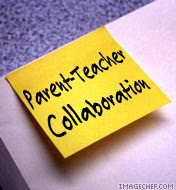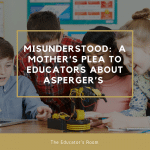[fusion_builder_container hundred_percent=”yes” overflow=”visible”][fusion_builder_row][fusion_builder_column type=”1_1″ background_position=”left top” background_color=”” border_size=”” border_color=”” border_style=”solid” spacing=”yes” background_image=”” background_repeat=”no-repeat” padding=”” margin_top=”0px” margin_bottom=”0px” class=”” id=”” animation_type=”” animation_speed=”0.3″ animation_direction=”left” hide_on_mobile=”no” center_content=”no” min_height=”none”]
I remember as a kid, the one thing that I dreaded more than receiving my report card was parent-teacher conferences. It was bad enough that I got a few C’s or even a D… but I did not need for a teacher to verbally express to my mother exactly what my “problem” was with regard to my performance in the classroom. So I never told her about them. We received calendars with the dates for the conferences but I never took them home. So the only time my mother ever attended such a conference was if and when she scheduled one herself. Indeed, history repeats itself in education, because many of my students are the exact same way. While there are some parents who go out of their way to stay on top of their children academically, many of my parents are either uninformed about parent-teacher conferences or don’t necessarily have the time to attend the conferences due to their work schedules. Of course, when parents don’t show up, students aren’t upset. However, in the changing landscape of education, I believe that parental involvement is vital to the success of students and the success of a school community. Indeed, a school is a community and a major part of that community is the parents of the students who attend the school and the families that surround that school.
Moment of the Week
One of the cool things about parent-teacher conferences is that I get to both speak to adults about their children, while the child is there in many cases, and I can also do some lesson planning between meetings with parents. Last Thursday, we had our second parent-teacher conferences of the school year. Our first installment saw parents scurrying around our building like unattended children; roaming from classroom to classroom waiting for teachers to finish talking so they can have their turn to discuss with them issues with their student(s). I did not have much time to get extra work done and I actually stayed an hour after conferences were over to continue talking to parents. Unfortunately, history did not repeat itself the second time around.
Last Thursday as I sat in my room, it was about 5pm when I realized that I had gotten a lot of work done. Then, I looked over at my sign-in sheet and realized that I had less than a third of the parents attend when compared to the first parent-teacher conference. Our conferences were over at 6:30pm and from the time I realized my attendance to the end of the night, there were only 2 more parents to come through my classroom doors; I may have had 8 parents in the span of 5 hours show up. That is discouraging enough. Even more discouraging was that a few of those parents weren’t accepting my reasons for the earned grades of their students. These were parents whose students received a B’s in my class and many A’s in their other classes. I heard things like “My child has never gotten B’s before… School comes easy for my child… I just cannot understand why my child received this grade when this is not normal.” Those chorus lines are nothing unfamiliar to teachers worldwide, but they are no less frustrating to hear.
Lesson of the Week
Public schooling in America is not as simplistic as people believe it to be. In fact, the school, with regards to a parent’s view, is often viewed like a sit-down restaurant; people order something and expect it exactly as they ordered it on their plate and depending on what the school serves, people may or may not show patronize your establishment. However, the truth of the matter is that the customer is not always right and unfortunately, it’s impossible to get what you think you’ve “paid for.”
There is indeed a disconnect between schools and the parents of the children who attend them. Many parents either expect too much of a school or expect too little of a school; the school often sees themselves as “educating” students which involves meeting state and national benchmarks to maintain good standing and maintain their funding stream; that does not always include dealing with the social and emotional needs of their student populations. There needs to be greater cooperation and discussion between schools and parents. Schools and teachers must go further than simply the occasional phone call either when things are bad with a student or good with a student. Schools must engage families and parents because the school is a community and it must be in community with those associated with it.
Whether a school is located in a suburban, urban or rural area, schools must provide learning opportunities for its parents in addition to establishing an open and transparent dialogue with parents in order to exchange vital information to help with the instruction of their children. School districts also must provide teachers and administrators with professional development designed to instruct them on how to meet the various needs of evolving student and family populations. As much attention needs to be paid to this as districts do with maintaining order in schools or raising test scores. As teachers, we must not only be advocates for our students but also advocates on behalf of parents and request that opportunities for collaboration and learning be created for parents and the community to create a sense of ownership in the school. Many of our parents don’t feel ownership in the school or the educating of their child because educators and policy makers do a great job of both withholding opportunities of collaboration with parents and establishing pseudo-collaborative efforts. We must not be hypocritical; we must do more to include our parents. We have to teach all students regardless of their abilities or feelings – so too must we include every parent regardless of what they think. If we build our schools on a foundation of parental engagement and collaboration, the parents will come.[/fusion_builder_column][/fusion_builder_row][/fusion_builder_container]




